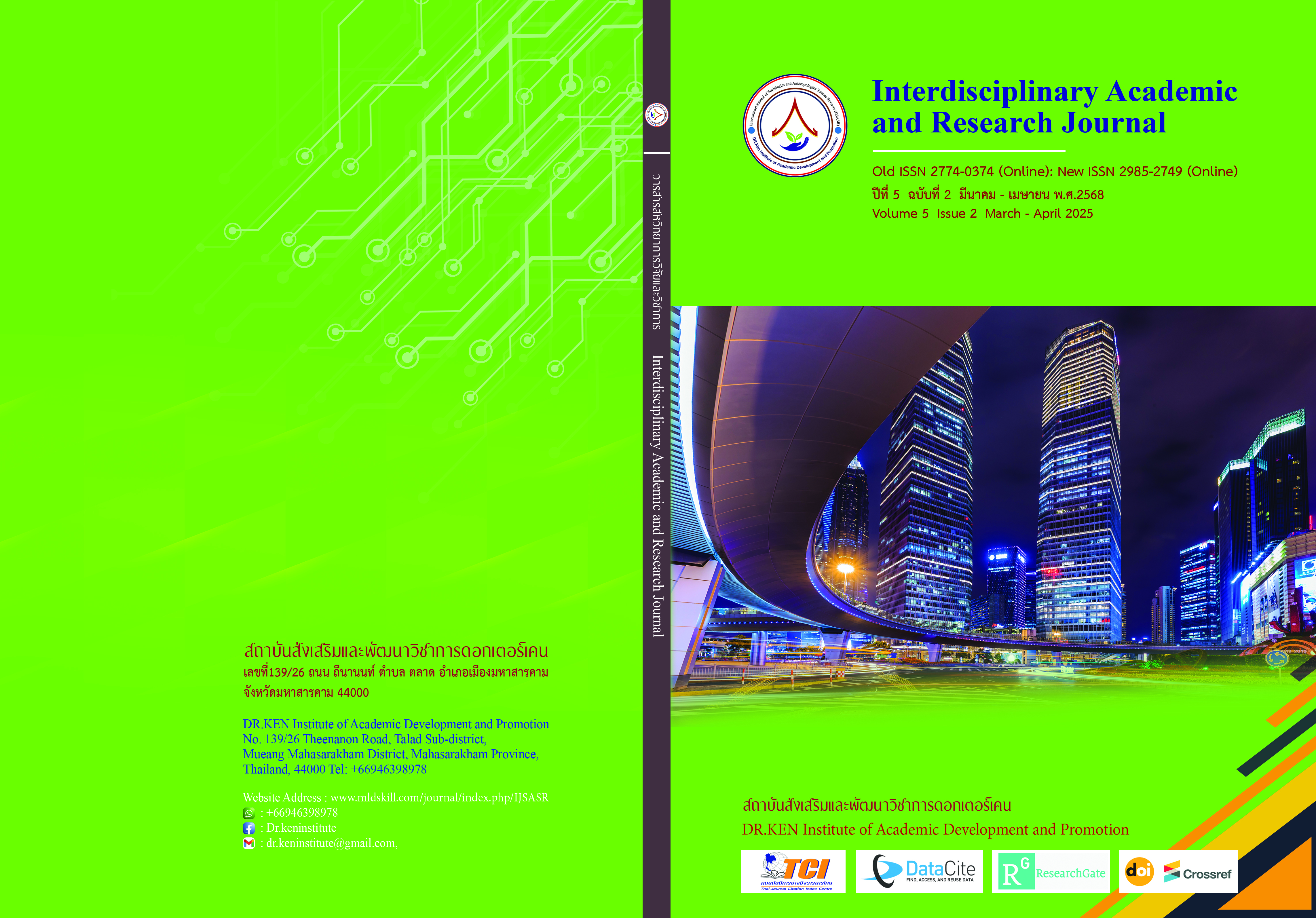The Effect of Transformational Leadership on Effective Academic Administration Under the Secondary Educational Service Area Office Bangkok 1
DOI:
https://doi.org/10.60027/iarj.2025.279528Keywords:
Transformational Leadership, Academic Administration EffectivenessAbstract
Background and Aims: The primary objective of the Public Sector's Achievement aim is for leaders to enhance their abilities and facilitate the growth of others to thrive in a dynamic environment. Furthermore, the essence of initiating a mental revolution is exhibiting courage, making sacrifices, and assuming personal and communal responsibility. In this research, the objectives were to 1) examine the degree of transformational leadership exhibited by administrators in educational institutions, 2) evaluate the efficacy of academic administration, 3) investigate the correlation between the transformational leadership exhibited by administrators in educational institutions and their level of administrative performance, 4) analyze the impact of transformational leadership by school administrators on the efficacy of academic administration in schools under the Secondary Educational Service Area Office Bangkok 1.
Methodology: This study is a survey-based investigation. Population refers to the entire group of individuals or objects that we are interested in studying. A sample, on the other hand, is a subset of the population that is selected to conduct a study or analysis. The sample group consisted of school administrators and instructors from the Secondary Educational Service Area Office Bangkok 1. The sample size was obtained via the Krejcie and Morgan tables, yielding 357 individuals. The specimen was obtained through the utilization of stratified random sampling. Based on the size of the school, a questionnaire was employed as the tool. It is defined as a system of assessment based on a range of values. The consistency index for each item was 1.00, whereas the confidence value was 0.987. The fundamental statistical measures employed were percentage, mean, and standard deviation. The statistical tests employed to evaluate the hypothesis consisted of Pearson's Product-Moment Correlation Coefficient and Stepwise Multiple Regression.
Results: The impact of transformational leadership on educational institution administrators. Overall, it is at an elevated level. Academic Administration Overall, the efficacy is at a high level. The effectiveness of academic administration is closely linked to the transformational leadership of school administrators. The high degree of optimism is statistically significant with a p-value of less than 0.01. Upon examining each variable, it was determined that there was a significant positive correlation at the .01 level. The collective factors can accurately forecast the efficacy of academic management within the institution. The Secondary Educational Service Area Office Bangkok 1 presents a prediction equation in two forms. The first form is expressed as raw scores: Y´ = .536 + 1.084X2 +.269X3 +.590X1 + .112X5. The second form is expressed as standard scores: Z´y = 1.235X2 + .253X3 + .650X1 + .108X5.
Conclusion: Transformational leadership was exhibited by administrators at educational institutions. According to the findings of the research conducted under the authority of the Bangkok Secondary Educational Service Area Office, Area 1, the overall results, as well as each aspect, were found to be at a high level. This is because educational institution directors in the present period must promptly adjust to alterations in the world. Educational institution administrators must recall the imperative of adapting to the situation. Suitably conduct yourself in your assigned position and responsibilities. Exhibit transformative leadership to transform the administration into a collaborative support system to effect positive transformation. Consequently, the school's academic administration is highly effective.
References
เกศสุดา วรรณสินธ์. (2562). ภาวะผู้นําการเปลี่ยนแปลงของผู้บริหารสถานศึกษา สังกัดสำนักงาน เขตพื้นที่การศึกษามัธยมศึกษาเขต 27. วิทยานิพนธ์ครุศาสตรมหาบัณฑิต สาขาวิชาการบริหารการศึกษา มหาวิทยาลัยราชภัฏมหาสารคาม.
จรุณี เก้าเอี้ยน. (2560). เทคนิคการบริหารงานวิชาการในสถานศึกษา กลยุทธ์และแนวทางการปฏิบัติสำหรับผู้บริหารมืออาชีพ. สงขลา : ชานเมืองการพิมพ์.
ชนกานต์ เอี่ยมสะอาด. (2563). ปัจจัยที่ส่งผลต่อประสิทธิผลการบริหารงานวิชาการของโรงเรียนมัธยมศึกษา จังหวัดพิษณุโลก. การศึกษาค้นคว้าอิสระ กศ.ม. สาขาการบริหารการศึกษา: มหาวิทยาลัยนเรศวร
ธัญญามาศ แดงสีดา. (2565). ภาวะผู้นำการเปลี่ยนแปลงของผู้บริหารโรงเรียนขยายโอกาสทางการศึกษา สังกัดสำนักงานเขตพื้นที่การศึกษาประถมศึกษาระยอง เขต 1. วิทยานิพนธ์ปริญญาศึกษาศาตรมหาบัณฑิต สาขาวิชาการบริหารการศึกษา มหาวิทยาลัยเกริก.
ธีร์ธนพัชร ร้อยดาพันธุ์. (2565). ความสัมพันธ์ระหว่างภาวะผู้นาทางวิชาการของผู้บริหารสถานศึกษากับประสิทธิผลการบริหารงานวิชาการของโรงเรียนประถมศึกษาในสังกัดสานักงานเขตพื้นที่การศึกษาประถมศึกษาสกลนคร เขต 1. วิทยานิพนธ์ครุศาสตรมหาบัณฑิต สาขาวิชาการบริหารการศึกษา มหาวิทยาลัยราชภัฏสกลนคร.
บุญชม ศรีสะอาด. (2556). การวิจัยเบื้องต้น. พิมพ์ครั้งที่9. กรุงเทพฯ : สุวีริยาสาส์น
ปรียาพร วงศ์อนุตรโรจน์. (2553). การบริหารงานวิชาการ. พิมพ์ครั้งที่ 5. กรุงเทพฯ : ศูนย์สื่อเสริม.
ปุณิกา เทียนใส, (2561). สภาพการบริหารงานวิชาการโรงเรียนวัดเศวตฉัตร สำนักงานเขตคลองสาน กรุงเทพมหานคร. วิทยานิพนธครุศาสตรมหาบัณฑิต สาขาวิชาบริหารการศึกษา มหาวิทยาลัยราชภัฏพระนคร.
พิพัฒน์พงษ์ วิเศษ. (2560). ภาวะผู้นำทางวิชาการของผู้บริหารโรงเรียนที่ส่งผลต่อประสิทธิผลการบริหารงานวิชาการในโรงเรียน สังกัดสานักงานเขตพื้นที่การศึกษาประถมศึกษาสกลนคร เขต 3. วิทยานิพนธ์ปริญญาครุศาสตรมหาบัณฑิต: มหาวิทยาลัยราชภัฏสกลนคร.
รัตติกรณ์ จงวิศาล. (2563). ภาวะผู้นำ ทฤษฎี การวิจัยและแนวทางสู่การปฏิบัติ. กรุงเทพฯ: จุฬาลงกรณ์มหาวิทยาลัย.
รุจาภา วงศ์กาฬสินธุ์. (2560). ความสัมพันธ์ระหว่างประสิทธิภาพของกระบวนการนิเทศ ภายในกับ ประสิทธิผลการบริหารงานวิชาการในโรงเรียน สังกัดสำนักงานเขตพื้นที่การศึกษาประถมศึกษา บึงกาฬ. วิทยานิพนธ์ครุศาสตรมหาบันฑิต สาขาวิชาการบริหารการศึกษา มหาวิทยาลัยราชภัฏสกลนคร.
รุจิร์ ภู่สาระ และจันทรานี สงวนนาม (2555). งานวิชาการเพื่อการศึกษา. กรุงเทพฯ: บุ๊คพอยท์
ละออ จันทร์ชุม และรวีวัตร์ สิริภูบาล. (2560).การศึกษาความสัมพันธ์ระหว่างภาวะผู้นำการเปลี่ยนแปลงของผู้บริหารสถานศึกษา กับสภาพการบริหารเทคโนโลยีสารสนเทศและการสื่อสารของสถานศึกษาสังกัดสำนักงานเขตพื้นที่การศึกษาประถมศึกษา พระนครศรีอยุธยา เขต 1. วารสารวิจัยราชภัฏกรุงเก่า มหาวิทยาลัยราชภัฏพระนครศรีอยุธยา, 4(1), 64-69.
สำนักงานเขตพื้นที่การศึกษามัธยมศึกษากรุงเทพมหานคร เขต 1. (2565). รายงานผลการทดสอบทาง การศึกษาระดับชาติขั้นพื้นฐาน (O-Net) ปีการศึกษา 2565. กรุงเทพฯ : กลุ่มนโยบายและแผน สังกัดสำนักงานเขตพื้นที่การศึกษามัธยมศึกษากรุงเทพมหานคร เขต 1.
สำนักงานเขตพื้นที่การศึกษามัธยมศึกษากรุงเทพมหานคร เขต 1. (2566). ข้อมูลสารสนเทศ. Retrieved on 10 August 2023 from: https://eoffice.sesao1.go.th /info/school-group.
สำนักงานศึกษาธิการกรุงเทพมหานคร. (2562). แผนพัฒนาการศึกษาจังหวัดกรุงเทพฯ พ.ศ. 2562 –2565. กรุงเทพฯ: สานักงานศึกษาธิการจังหวัดกรุงเทพมหานคร.
สุขุม จูสนิท. (2560). ภาวะผู้นำการเปลี่ยนแปลงของผู้บริหารสถานศึกษา สังกัดสำนักงานเขตพื้นที่ การศึกษาประถมศึกษาปทุมธานี. วิทยานิพนธ์การศึกษามหาบัณฑิต มหาวิทยาลัยราชภัฏวไลยอลงกรณ์ ในพระบรมราชูปถัมภ์.
สุรีย์พร ฟากฟื้น. (2561). ภาวะผู้นําของ ผู้บริหารที่ส่งผลต่อประสิทธิผลการบริหารงานวิชาการในสถานศึกษา สังกัดสำนักงานเขต พื้นที่การศึกษาประถมศึกษาราชบุรี เขต 1. วารสารสหวิทยาการมนุษยศาสตร์และสังคมศาสตร์. 1(3), 27-40.
อุทัย บุญประเสริฐ. (2557). หลักสูตรและการบริหารงานวิชาการโรงเรียน. กรุงเทพฯ : เอสดีเพรส
อุทุมพร จันทร์สิงห์. (2561). ความสัมพันธ์ระหว่างภาวะผู้นําการเปลี่ยนแปลงของผู้บริหารสถานศึกษากับการทำงานเป็นทีมในโรงเรียน สังกัดสำนักงานเขตพื้นที่การศึกษาประถมศึกษาปทุมธานี เขต 2. วิทยานิพนธ์ศึกษาศาสตรมหาบัณฑิต สาขาวิชาการบริหารการศึกษา มหาวิทยาลัยเทคโนโลยีราชมงคลธัญบุรี.
Bass, B.M., & Avolio, B.J. (1990). Transformational Leadership Development. Pola Alto, California: Consulting Psychologists
Krejcie, R.V., & Morgan, D.W. (1970). Determining Sample Size for Research Activities. Educational and Psychological Measurement, 30 (3), 607 - 610.
Leithwood, K., & Jantzi, D. (1966). Toward an Explanation of Variation in Teacher’s Perceptions of Transformational School Leadership. Ohio: South-Western College
Sutamdee, C., & Sonwa, S. (2017). Leadership Behavior and Organizational Change. Journal of Social Science, Law, and Politics, 1(2), 104 – 124.
Downloads
Published
How to Cite
Issue
Section
License
Copyright (c) 2025 Interdisciplinary Academic and Research Journal

This work is licensed under a Creative Commons Attribution-NonCommercial-NoDerivatives 4.0 International License.
Copyright on any article in the Interdisciplinary Academic and Research Journal is retained by the author(s) under the under the Creative Commons Attribution-NonCommercial-NoDerivatives 4.0 International License. Permission to use text, content, images, etc. of publication. Any user to read, download, copy, distribute, print, search, or link to the full texts of articles, crawl them for indexing, pass them as data to software, or use them for any other lawful purpose. But do not use it for commercial use or with the intent to benefit any business.
















.png)


